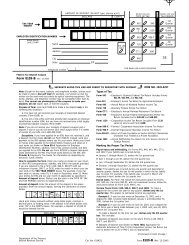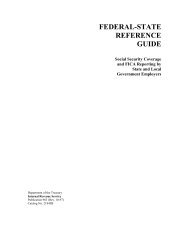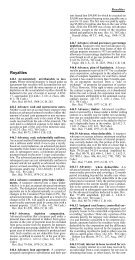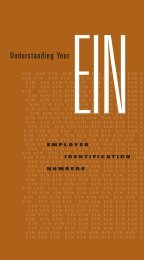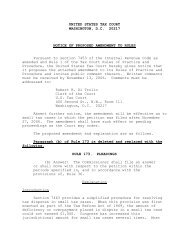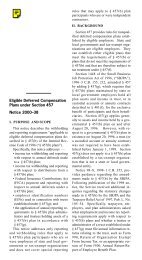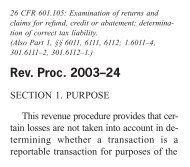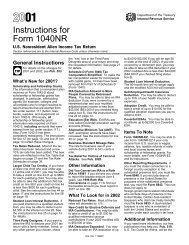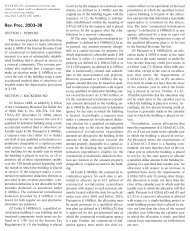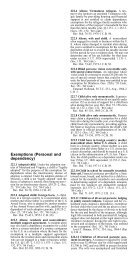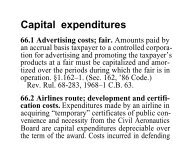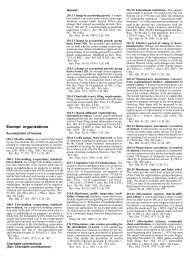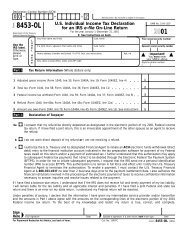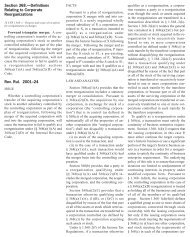Auto Dealerships - Audit Technique Guide - Uncle Fed's Tax*Board
Auto Dealerships - Audit Technique Guide - Uncle Fed's Tax*Board
Auto Dealerships - Audit Technique Guide - Uncle Fed's Tax*Board
You also want an ePaper? Increase the reach of your titles
YUMPU automatically turns print PDFs into web optimized ePapers that Google loves.
Chapter 12<br />
Extended Service Contracts – "Dealer Reserve Accounts"<br />
When a dealership acts as obligor on an extended service contract it may chose to cover its<br />
risk through an arrangement other than insurance such as by placing a portion of the sales<br />
price in an "reserve" (also known as an escrow or trust account) maintained by an<br />
administrator. The dealer generally, establishes the selling price of the contract, retains a<br />
portion as "commission" and forwards the remainder to an administrator. The administration<br />
agreement may require the establishment of an "escrow" "reserve" or "trust" account to<br />
provide for the dealer’s obligations under the contract.<br />
The administrator acts as "trustee" of the funds and retains a portion of the funds submitted to it<br />
as a fee for its services. Funds in the "reserve" account are used to meet the obligations of the<br />
dealer including payment for repairs to covered vehicles. The amounts placed in reserve may be<br />
based on actuarial standards and the dealer may have certain sales requirements. When certain<br />
conditions are met, the dealer is entitled to a return of unused reserve funds at the expiration of<br />
the extended service contract. Unless the contract is cancelled, the retail customer does not<br />
receive any portion of the unused reserve funds, even if no repairs are made to the covered<br />
vehicle. Often the funds deposited in the reserve accounts earn investment interest that is<br />
deposited into the reserve. Funds placed in the escrow account do not constitute payments for<br />
insurance.<br />
Sometimes the program includes a provision for purchasing "stop loss" or "excess loss" insurance<br />
that may pay for claims if the reserve or escrow account does not contain adequate funds. The<br />
payments for stop loss or excess loss coverage may constitute payments for insurance.<br />
Dealership that sell service contracts and cover their risk under a reserve program must include<br />
the entire sales price of the extended service contract in income in the year the contract is sold.<br />
Payments to the reserve account do not constitute payments for insurance. The dealership may<br />
deduct payments for claims as incurred.<br />
Reserve, escrow, or trust extended service contract plans do not qualify for the Service Warranty<br />
Income Method of reporting income.<br />
The Tax Court addressed similar issues in Hinshaw’s, Inc. above and Rameau Johnson et al. 108<br />
T.C. No. 22, Affirmed by 8th Circuit Court of Appeal 84 AFTR2d. Par. 99-5073; No. 98-1324<br />
(July 21, 1999).<br />
In Rameau Johnson, the dealerships retained a portion of the contract price as profit and<br />
forwarded the remainder to the administrator for deposit in an escrow account, for payment of<br />
administration fees, and for the purchase of excess loss insurance. The escrow amounts earned<br />
investment income. Dealers received distributions from the escrow accounts, within certain<br />
limitations, for specified purposes such as compensation for covered repairs, cancellations, and<br />
the release of "unconsumed reserves" at the expiration of a contract. The dealerships included in<br />
current income the profit portion of the contract price but included the escrow amounts as they<br />
were released.<br />
12-1



